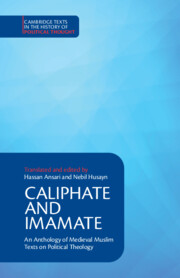Book contents
- Frontmatter
- Contents
- Acknowledgments
- Note on the Translation
- Introduction
- Glossary of Key Terms
- Selected Theological Writings
- 1 A Précis of the Doctrines of Abū ’l-Ḥasan al-Ashʿarī by Ibn Fūrak
- 2 The Succor of Nations amidst the Confusion of Darkness by al-Juwaynī
- 3 The Theoretical Underpinning of the Imamate by Abū Ṭālib al-Hārūnī
- 4 The Curative Book on the Imamate: A Paraphrastic Rendering by al-Shaykh al-Ṭūsī
- 5 The Book of Excellence on the Fundamental Principles of Religion by Ibn al-Malāḥimī
- 6 The Concise Book of Doctrines by ʿAbd al-Kāf ī al-Warjalānī
- 7 The Crown of Doctrines and the Mine of Instructive Points by al-Dāʿī Ibn al-Walīd
- Bibliography
- Index
- Cambridge Texts in the History of Political Thought
6 - The Concise Book of Doctrines by ʿAbd al-Kāf ī al-Warjalānī
from Selected Theological Writings
Published online by Cambridge University Press: 19 October 2023
- Frontmatter
- Contents
- Acknowledgments
- Note on the Translation
- Introduction
- Glossary of Key Terms
- Selected Theological Writings
- 1 A Précis of the Doctrines of Abū ’l-Ḥasan al-Ashʿarī by Ibn Fūrak
- 2 The Succor of Nations amidst the Confusion of Darkness by al-Juwaynī
- 3 The Theoretical Underpinning of the Imamate by Abū Ṭālib al-Hārūnī
- 4 The Curative Book on the Imamate: A Paraphrastic Rendering by al-Shaykh al-Ṭūsī
- 5 The Book of Excellence on the Fundamental Principles of Religion by Ibn al-Malāḥimī
- 6 The Concise Book of Doctrines by ʿAbd al-Kāf ī al-Warjalānī
- 7 The Crown of Doctrines and the Mine of Instructive Points by al-Dāʿī Ibn al-Walīd
- Bibliography
- Index
- Cambridge Texts in the History of Political Thought
Summary
Chapter six presents the views of the Ibāḍī scholar Abū ʿAmmār ʿAbd al-Kāfī b. Yūsuf al-Warjalānī (d. ca. 570/1174) in his Concise Book (al-Mūjaz). In this work, al-Warjalānī defends those doctrines that he considers to be correct and refutes the views of rival religious traditions, both Muslim and non-Muslim. His chapter on the imamate provides a broad overview of Khārijī and Ibāḍī views on the qualities of a legitimate imam. The function of the imam is to aid the community in commanding right, forbidding wrong, establishing justice, and administering ḥudūd (fixed, nondiscretionary penalties). The Khārijī-Ibāḍī tradition is unique in outlining a procedure for the removal of an imam. If an imam violates a divine commandment, he should be compelled to seek repentance. Repeat offenses or a refusal to repent are grounds for disqualification and removal from office. If an imam refuses to give up his authority, he is to be fought until he is dislodged from power or killed. For the Ibāḍīs, cancelling the authority of an imam to restart the selection process and appoint another is considered a legitimate procedure. When the Ibāḍīs do not have the ability to appoint imams, their doctrine permits them to dissimulate and live peacefully among non-Ibāḍī Muslims.
Keywords
- Type
- Chapter
- Information
- Caliphate and ImamateAn Anthology of Medieval Muslim Texts on Political Theology, pp. 140 - 147Publisher: Cambridge University PressPrint publication year: 2023



